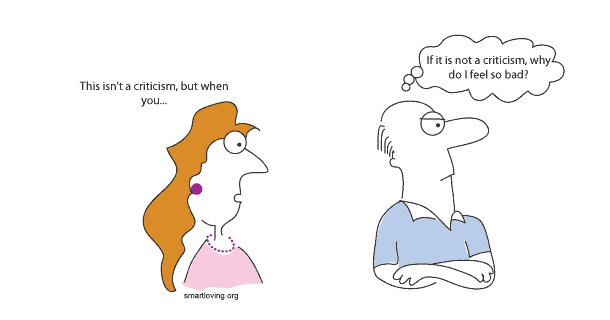Criticism Cancer

Criticism Can Kill
Criticism kills not only the self-esteem of the one criticized, it also kills the spirit of optimism in the criticizer. In marriage it is a deadly cancer, eroding our trust and destroying confidence in our relationship. Criticism damages our sense of worthiness. When we are criticized, our doubts about ourselves are confirmed. The negative self talk (“I’m not good enough”, “I’m not likable”, “I’m a nuisance”, etc) is reinforced and our belief in our acceptability is eroded. If the criticism is sustained, eventually, we begin to view everything in our life as confirmation of our negative self beliefs.
The Damaging Effects
Criticism, not only damages the person criticized, it also infects the person making the criticism. When we criticize another, we fail to see and relate to them as a unique and precious person. We see only their faults and overlook their value and dignity as human persons. Our attention is drawn towards who they are not, rather than who they are. When criticism is habitual, our capacity to recognise goodness is undermined. We become embittered and cynical. We lose the gift of hope and instead, become entrenched in a pessimistic perspective. Good things are mistrusted and any kind gesture or good act is cynically suspected of having selfish motivations.
When criticism becomes a recurrent feature in a marriage, our trust is eroded as each of us puts in place defensive behaviors which protect us from further hurt: emotional withdrawal, submissive compliance, secret rebellion, lying, perfectionism, over-achieving, retaliation, verbal attacks, and investment in people and things outside the marriage (such as hobbies, career, children, friends). We may also become critical ourselves in a misguided ‘strike first’ defense strategy. While some marriages will survive in such a climate, many others will founder.
Affirmation vs Criticism
The antidote to criticism, is to refocus our attention on the good qualities of our spouse.When we make a habit of affirmation, we not only build up the self-esteem of our spouse, we also transform our attitude from cynical pessimism, to one of optimistic gratitude. We start noticing things that we previously overlooked – positive, wonderful things that we take for granted. We start to feel blessed rather than ‘hard done by’. We begin to feel genuine delight rather than persistent disappointment. Such an attitude inspires us to spontaneously act with generosity and kindness – qualities which will endear us to our spouse and elicit praise and affection in return.
Tip for Smart Loving: You can change the character of your marriage (with or without your spouse’s cooperation) by displacing criticism with affirmation. At least once a day tell your spouse: “One thing that I appreciated about you today is…”







This is such a valuable point that needs to be spread in the wider community of married couples. If everyone would enter marriage with this as their framework for how to address issues in their marriage, there’d be a lot less of them breaking down. Relying on your spouse to be the source of your happiness will only lead to resentment when they fail to reach the standard. Rather, I think if two people were to enter marriage each with a lifetime commitment of making the other person happy, they would experience the deeper sense of happiness that comes with giving.
This is such a valuable point that needs to be spread in the wider community of married couples. If everyone would enter marriage with this as their framework for how to address issues in their marriage, there’d be a lot less of them breaking down. Relying on your spouse to be the source of your happiness will only lead to resentment when they fail to reach the standard. Rather, I think if two people were to enter marriage each with a lifetime commitment of making the other person happy, they would experience the deeper sense of happiness that comes with giving.